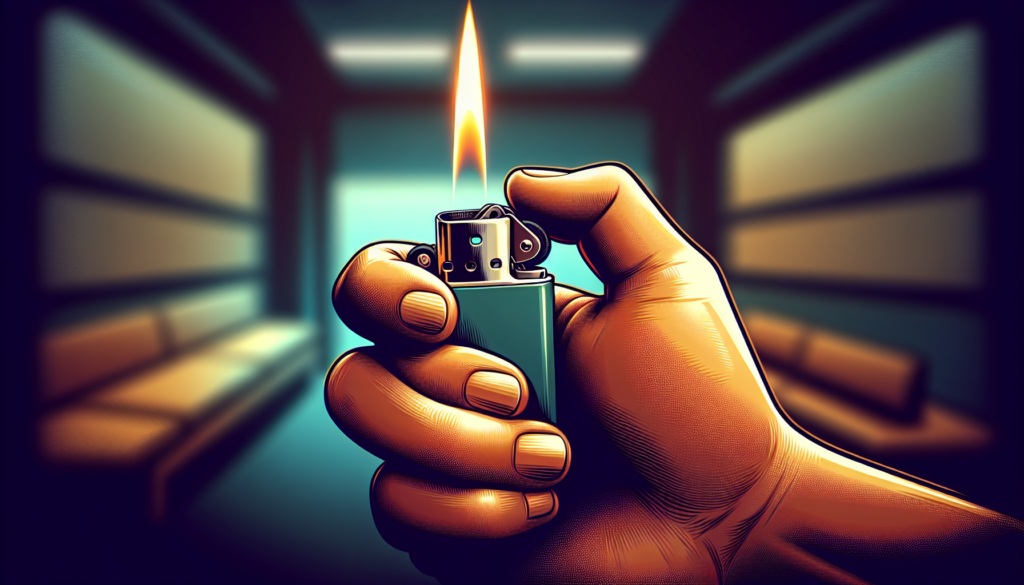In the societal labyrinth of age-restricted purchases, the commonly asked question is often, ‘How old do you have to be to buy a lighter?’. Although regarded as a simple device, the prospect of unrestricted access to what technically equates to portable fire can provoke intense scrutiny. Thus, this article confronts the quagmire of local and global laws surrounding the possession and acquisition of lighters. It offers you, the reader, a thorough understanding of the public policies, governmental restrictions, and varying legalities that may form the boundaries defining how old one must be to legally procure a lighter.

Minimum Age to Buy a Lighter
Lighters, while commonplace, can pose a significant safety risk when not used properly. These practical, everyday items find their use in various settings from household chores to outdoor activities. Yet their accessibility raises questions, particularly when it pertains to their purchase by minors. Let’s delve into determining the legal age at which a lighter can be purchased.
Determining the Legal Age
The process of determining the legal age for purchasing a lighter often hinges upon the inherent risks they pose. Given their use in igniting material which can cause fires, many jurisdictions naturally prefer to limit their accessibility to mature individuals capable of handling such potential hazards responsibly. Therefore, setting an age requirement for purchasing lighters is typically an integral part of legislations designed to promote safety.
Variations in Age Requirements by Region
The age requirements for buying a lighter display stark differences from one region to another. In some areas, lighters are regarded as typical commodities and can be bought by anyone, regardless of age. However, in some jurisdictions, regulations necessitate that you must be above a certain age, usually 18 or above, the age considered for legal adulthood, highlighting the importance of being aware of local regulations.
Federal Regulations for Lighter Purchases
Federal laws, whilst often setting the overarching legal framework, can sometimes leave room for grey areas when it comes to particular items like lighters.
Laws Related to Age and Lighter Purchases
At the federal level, the United States does not have a law specifying a minimum age for buying lighters. The absence of specific federal restrictions indicates that lighters are generally not considered age-restricted items. However, retailers may set their own policies, and states can have more stringent regulations.
Who Enforces Federal Regulations
While there may be no explicit federal statute governing the purchase of lighters, enforcement of existing federal laws would typically fall under the respective federal agencies. The Bureau of Alcohol, Tobacco, Firearms and Explosives (ATF) or the Consumer Product Safety Commission could potentially play a role in enforcing any restrictions on lighter sales.
State Regulations for Lighter Purchases
Whereas the federal government does not impose a specific minimum age for buying lighters, the landscape shifts when considering laws at the state level.
Comparison of State Requirements
Understanding state-level regulations regarding the purchase of lighters can be a complex endeavor. Some states may mandate a minimum age for buying lighters, most commonly 18 or older. Others, however, may not specify any age related restrictions, leaving the matter at the discretion of retailers.
Which States have Regulations in Place
A handful of states, like California and Pennsylvania, do require age verification when purchasing lighters, usually requiring the buyer to be at least 18. Yet, most of the states do not have explicit regulations about the minimum age for lighter purchases.

Factors Influencing Lighter Purchase Regulations
Laws surrounding the purchase of lighters are influenced by a variety of factors. Let’s explore why age restrictions for lighters might exist.
Why Age Regulations for Lighters Might Exist
The prime reason behind age regulations for lighters is safety. Lighters can cause significant harm if misused, intentionally or accidentally. By restricting sales to minors, the law aims to reduce such risks. Moreover, lighter fluid is considered a hazardous substance, and its sale is typically regulated.
Concerns About Fire Safety
Misuse of lighters could lead to devastating consequences, including fires causing extensive property damage and potential loss of life. Many accidents involving fire are caused by child’s play where lighters or matches are involved.
Potential Misuse of Lighters by Minors
The potential misuse of lighters by children and teenagers is a growing concern. This ranges from accidental fires resulting from curiosity and lack of understanding about the item’s potential danger, to deliberate acts of arson. Age restrictions can serve to deter such risky behaviors.
Process of Buying a Lighter
The process of buying a lighter hinges upon both the purchaser and the retailer. Understandably, both parties bear a significant level of responsibility when facilitating these transactions.
Retailer Responsibilities When Selling Lighters
Retailers, whether small local businesses or national chains, often implement policies that incorporate both federal and state laws, as well as additional measures designed to ensure the safety of their consumers. They are required to enforce these policies and may ask for identification to verify age before selling a lighter.
Challenges in Enforcing Age Requirements
Enforcing age requirements for lighter purchases often poses a challenge. Retailers can find it difficult to accurately determine customers’ ages without proper identification. Additionally, these age restrictions can be easily circumvented, particularly when lighters are purchased online.
Lighters vs. Other Age-Restricted Items
While lighter purchase laws might seem overly cautious to some, comparing them to regulations in place for other age-restricted items provides context.
Comparison of Rules for Buying Lighters and Tobacco
Though they can both potentially cause harm, the regulations for purchasing tobacco and lighters differ significantly. Tobacco products have strict federal and state regulations due to their adverse health effects, often requiring purchasers to be 21 years old. Lighters, despite their potential danger, don’t fall into the same highly-regulated category.
Comparison of Rules for Buying Lighters and Alcohol
Alcohol, like tobacco, is highly regulated. Every state mandates a minimum drinking age of 21 years. Despite potential dangers, alcohol and lighters aren’t categorized similarly in terms of purchasing regulations.
Possible Penalties for Underage Purchase of Lighters
Knowing the potential penalties for underage purchase of lighters is important.
What Happens When Someone Underage is Caught Buying a Lighter?
If an underage individual is caught buying a lighter, penalties vary depending upon local and state laws. While some states may impose fines or recommend educational programs for violations, others may simply confiscate the lighter.
How are Penalties Enforced
Penalties are typically enforced by local law enforcement or other regulatory bodies. It’s worth noting that penalties can also extend to retailers who sell lighters to underage individuals, adding another layer of complexity to this issue.
Buying Lighters Online
As online markets continue to rise, age verification becoming a more pronounced challenge.
Differences in Online Age Regulations
Online platforms often lack stringent age verification processes compared to physical stores, making it considerably easier for underage individuals to buy lighters. While some web platforms may require users to confirm their age, this relies heavily on honesty from the consumer.
Challenges in Enforcing Online Age Verification
Enforcing online age verification proves challenging, as it can easily be bypassed through deception. For instance, a minor can enter a fictitious age to bypass age check barriers on online platforms selling lighters.
Public Opinions on Age Restrictions for Lighters
Public sentiments about age restrictions for purchasing lighters vary broadly.
Surveys on Public Opinion
Public opinions on lighter purchase policies are often split. While some see an age restriction as a prudent safety measure, others regard it as an unnecessary law infringing on personal freedoms. Perspectives usually depend on factors like personal experience and familiarity with fire-related incidents involving minors.
Arguments For and Against Age Restrictions
Those who support age restrictions often highlight the safety aspect, aiming to protect both individuals and property from potential fires caused by lighter misuse by minors. On the other hand, opposing views argue that age restrictions can be seen as over-regulation, advocating instead for more comprehensive safety education.
How to Advocate for Changes in Lighter Purchase Laws
Here’s what you can do to advocate for changes in lighter purchase laws.
Organizations Fighting for Changes
Several organizations actively campaign for changes in lighter purchase regulations, pushing for tighter restrictions or greater education on safe use. If you’re interested in advocating for change, getting involved with such organizations can be a good starting place.
Steps to Take if You Want to Advocate for Change
If you wish to advocate for changes in lighter purchasing laws, you could start by researching the existing legislation in your state. Then, write to your local or state representative expressing your concerns or suggestions. Joining hands with relevant advocacy groups can also bolster your efforts. Ultimately, action and dialogue are key in shaping the policies that govern our lives.

